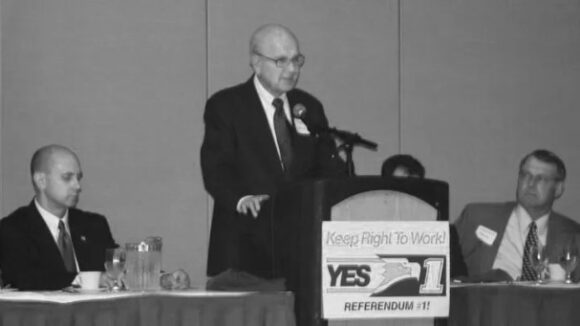Vague ‘Job Growth’ Talk Won’t Rescue Languishing Big Labor-Controlled States
(Source: November 2010 Forced-Unionism Abuses Exposed) Just a few months ago, millions of Americans were dismayed by reports, based on official U.S. Labor Department Bureau of Labor Statistics (BLS) data, that from 1999 through 2009 our country endured a “lost decade” in private-sector employment. In this context, the term “lost decade” refers to annual BLS statistics showing that in 2009 there were 107.95 million private-sector jobs nationwide, roughly 370,000 fewer than in 1999, when there were 108.32 million. Americans are right to be deeply concerned by such national data, but they can easily mislead us. Exactly half of the 50 states actually experienced a net gain in private-sector employment during the “lost decade,” and the five biggest absolute gainers, Arizona, Florida, Texas, Nevada, and Virginia, added a combined total of more than 1.6 million private-sector jobs. Meanwhile, California, Illinois, Indiana, Michigan and Ohio, the five states shedding the most private-sector jobs, lost a net total of more than 1.9 million. The five biggest job gainers have one common characteristic: They all have Right to Work laws on the books that prohibit the firing of employees for refusal to join or pay compulsory fees to an unwanted union. Not one of the five biggest job losers has such a law. Consequently, workers in these states are routinely forced into a union as a job condition. Aggregate private-sector employment in the 22 Right to Work states increased by 3.7% during the “lost decade,” even as it fell by 2.8% in the 28 forced-unionism states. The sharp disparity is no coincidence. Leading labor economists such as Dr. Richard Vedder of Ohio University have shown repeatedly that forced unionism hinders job creation.

